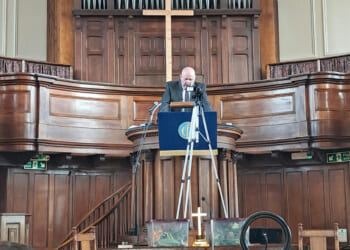Jim Allister KC is the Traditional Unionist Voice (TUV) MP for North Antrim, and a former MEP and MLA.
Since the signing of the profoundly misguided Chagos Treaty on 22 May, some have talked as if a House of Commons vote to approve ratification is a foregone conclusion. In reality, though, the Constitutional Reform and Governance Act 2010 makes it clear that unless Parliament objects to ratification within the set time period for doing so, the Government will then proceed to ratify. The objection period for this treaty ends on 3 July. If MPs want to object, they must do the following: First, an Early Day Motion must be tabled stating that the treaty should not be ratified and as many MPs as possible must sign, then they must lobby the Government to provide time for a debate on the motion and then Parliament must vote for that motion at the conclusion of the debate.
I worked on the Early Day Motion between Monday and Wednesday, liaising with the Leader of the Opposition, Kemi Badenoch, the leader of Reform UK Nigel Farage and others. The EDM was published in the very early hours of this morning and now the task is to persuade as many MPs as possible to sign and the Government to provide time for a debate. Of course, the Government could choose to ignore the motion and not grant a debate but there would be a significant political cost for them associated with such a strategy.
In all this, our task must be to call out the central deceit in the treaty, the claim that it completes the decolonisation of Mauritius. The relevant international law on decolonisation is very clear that decolonisation is not something that happens to a territory apart from its people. In this context it is not possible to complete decolonisation in the way the treaty proposes because we are only dealing with territory, the people of the territory having been removed.
Moreover, for those whose purposes depend on clinging to the old colonial boundaries, it is also important to be aware that while there is an expectation in international law that the territorial integrity of a colony should be upheld until decolonisation, there is no assumption that the resulting self-determination will then preserve those boundaries, see UN Res 742 VII Nov 1953. Self-determination might affirm the territory of the colony but equally it might result in the people electing to become part of another state, on the basis of absolute equality with its citizens, or it might result in a decision to break up into more than one country.
In this context the point must be made that it would not have been at all surprising had self-determination resulted in the formation of two different entities because the inclusion of Mauritius and the Chagos islands in the same colony has always been regarded as somewhat arbitrary. For a start the distance between them is 1,339 miles, the distance from Kent to North Africa, and then the peoples of the islands are quite different both in terms of ethnicity and religion.
When these points are appreciated, engagement with the Chagossian people becomes even more important.
Some might try to defend the treaty on the basis that while the people of the Chagos islands have been removed from their lands, they live in Mauritius and so have been given a voice in the treaty through the Republic of Mauritius. This argument is, however, completely unsustainable. In the first instance most Chagossians do not live in Mauritius and are not represented by the Republic of Mauritius. In the second instance those that do live in Mauritius, do so because they were moved there against their will and assertions of discrimination have been made by some.
The other difficulty flows from the fact that decolonisation is supposed to take place under the oversight of the United Nations and all living Chagossians live in countries that are UN Member states. It, therefore, makes no sense to pretend that it is not possible to engage with the people of the territory to affect a proper process of decolonisation. Rather than correcting the historic injustice this approach simply compounds it. As I point out in my supplementary EDM which sets out some arguments for refusing to ratify the treaty ‘…as the Chagossian people all live in UN Member states, exploiting their absence from their islands to validate the transfer of those islands to Mauritius without consulting them, simply compounds the injustice of their forcible removal, replacing one form of colonialism with another.’
Then we must engage with the problem that the costs associated with the deal are extortionate, mistreating the British taxpayer at a time of public spending cuts and tax rises. This difficulty is greatly compounded by the fact that the treaty proposes that these extortionate costs should be paid to the wrong people.
Finally, we must engage with the geo-strategic implications of the treaty. The truth is that China is close to Mauritius. Indeed, Mauritius is the first African country with which China did a free trade deal and has served in some ways as its gateway to Africa. Then we must not lose sight of the fact that during the same week the treaty was announced, the Russian government visited and entered into an agreement with Mauritius to boost cooperation in fishing and marine research.
There are, of course, other avenues by which to oppose to the Chagos Treaty that must be pursued, especially in the courts, but it is vital that the House of Commons does everything in its power to try to delay indefinitely the ratification of the treaty. I hope that MPs will sign in very large numbers, and that the Government will step back from the brink and adopt a radically different approach.


![Former Bravo Star Charged After Violent Assault Using a Rock-Filled Sock in Tennessee Walmart [WATCH]](https://www.right2024.com/wp-content/uploads/2025/07/Former-Bravo-Star-Charged-After-Violent-Assault-Using-a-Rock-Filled-350x250.jpg)



![Karoline Leavitt Levels CNN's Kaitlan Collins and Other Legacy Media Reporters [WATCH]](https://www.right2024.com/wp-content/uploads/2025/07/Karoline-Leavitt-Levels-CNNs-Kaitlan-Collins-and-Other-Legacy-Media-350x250.jpg)
![Man Arrested After Screaming at Senators During Big Beautiful Bill Debate [WATCH]](https://www.right2024.com/wp-content/uploads/2025/06/Man-Arrested-After-Screaming-at-Senators-During-Big-Beautiful-Bill-350x250.jpg)

![Illegal Alien Walked Free After Decapitating Woman, Abusing Corpse for Weeks [WATCH]](https://www.right2024.com/wp-content/uploads/2025/07/1753013138_Illegal-Alien-Walked-Free-After-Decapitating-Woman-Abusing-Corpse-for-350x250.jpg)






